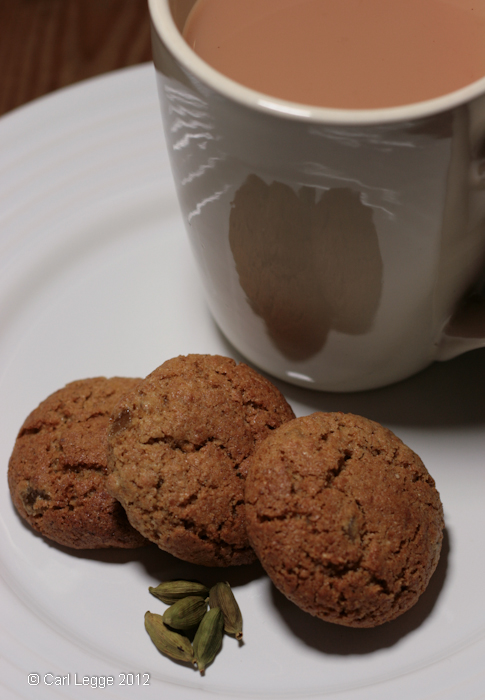This is the latest in the Short and Tweet Challenge.
I just love using spelt in baking. I add it to yorkshire pudding batter, shortcrust pastry and love it as a percentage in my sourdough bread.
We’d made these cookies when we first got Dan’s book and loved them. This time I had a look in Niki Segnit’s wonderful Flavour Thesaurus for ginger companions. To my delight, cardamom came up as a perfect partner. I have a bit of a thing for cardamom as my rhubarb polenta cake recipe testifies.
So we added half a teaspoon of ground cardamom to the recipe. It gives a subtle warmth and complexity to the biscuit and partners well with the tea or coffee accompaniment.
The only other change was to omit the 50g of caster sugar. We haven’t got hugely sweet teeth here and it worked out just fine.
Definitely a cookie recipe to save, they are dead quick and easy to make for when those guests arrive at short notice (you lot in Kent know who you are!)

Comments
9 responses to “Spelt, ginger and cardamom cookies”
Do you have a recipe for these cookies, or similar? If not I’ll experiment. Using cardamom with ginger sounds a great idea. I use spelt flour all the time because wheat has a bad effect on me but I’m fine with spelt. We buy it in 25kg bags becuase we make all our own bread – I make sourdough loaves and my husband uses fresh yeast to make rolls.
Hi Louise
The recipe is adapted from one Dan Lepard’s book Short & Sweet. It’s a great book which you should get if you can or borrow from the library. I really like spelt flour in bread and other baking. Which mill do you get your flour from?
Thanks for popping by 🙂
We have a plum orchard over here in Western Australia. All the plums are ripe now so I can recommend stewing plums with ginger, cardamon and coconut. You will end up with something so delicious.
I really like your blog. I stayed in the Ship Hotel Aberdaron 50 years ago when I was tiny, my father is grew up in Caernarfon. I have never forgotten that holiday even after all these years. A very special part of the world.
Hi Lydia
Thanks so much for your kind comments and for your recollections of the area. The Ship Hotel is still going strong. Caernarfon has changed a lot in the intervening years. I first came to the area in 1976 and the change is noticeable from then. Caernarfon now has a bypass, multi-storey car park, big supermarket and docks development. The Castle is still a picture and the scenery and wildlife around the coastline magnificent. You are right, it is a special part of the world.
I will try your plum recipe when they are in season here – it sounds gorgeous. We’re currently having a bit of winter here with sub-zero temperatures. So the wood burning stove is on and keeping us warm.
Enjoy your summer and do visit my blog again.
Best regards
I added cardamom to both the spelt and ginger and rye and raisin cookies and don’t regret it – it’s a delightful spice in so many ways. My cookies resemble yours – did you use white or regular spelt flour?
My next experiment with this will be to see if the dough stores well in the fridge or should be used within 24hrs or so.
Thanks for contributing to the #shortandtweet 12 cookie compilation.
Hi there EM
Just love cardamom, so good in sweet and savoury foods. Yum!
I use a Shipton Mill’s wholemeal spelt now, having come over from using Bacheldre Mill’s.
I’d be interested to hear the results of your experiment. Love doing the S&T Challenge stuff, greatly appreciate the effort to take to make it all happen 🙂
Great idea to add the cardamom. Definitely going to try that next time. Have you tried the coffee and cardamom cookie recipe in the book?
I love spelt flour and use it quite often. I’ve made cookies with it before but your cookies look fantastic!
They’d be biscuits in Australia but I’m learning to translate. LOL
Hi Maureen
GB, Aussie and the USA – all separated by a common language 🙂
Dan deals with the biscuit/cookie conundrum in his book. He ends up saying: “I love my biscuits but, sometimes, I just hanker for the exuberance of a cookie.”
Originally the word ‘biscuit’ referred to a hard, twice baked product (bis – twice: cuit – baked/cooked). And cookie derived from the Dutch ‘koekje’ which was taken to the USA before it was the USA 😉
So I think in modern usage (at least in GB) the biscuit is a hard product and the cookie a richer confection.
Does that sound plausible?
Thanks for popping by again 🙂